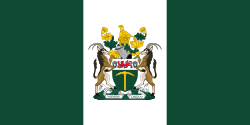| Minister of Internal Affairs of Rhodesia | |
|---|---|
 | |
 | |
| Ministry of Internal Affairs (INTAF) | |
| Style | The Honourable |
| Member of | The Cabinet |
| Reports to | The Prime Minister |
| Seat | Salisbury, Rhodesia |
| Appointer | The Prime Minister |
| Term length | No fixed term |
| Precursor | Minister of Native Affairs |
| Inaugural holder | William Muter Leggate |
| Formation | 1933 |
| Final holder | Jack Mussett |
| Abolished | 1 June 1979 |
| Succession | Minister of Home Affairs |
| Deputy | Deputy Minister of Internal Affairs |
The Minister of Internal Affairs was the head of the Ministry of Internal Affairs, or INTAF, a department of the Rhodesian government concerned with the welfare and development of Rhodesia's rural black population. During the Rhodesian Bush War, the ministry also played a significant military role. The Minister of Internal Affairs was appointed by the Prime Minister of Rhodesia.
Contents
The office was first created in 1923 as the Colonial Secretary of Southern Rhodesia. In 1933, it was reconstituted as the Minister of Internal Affairs. [1] In 1979, with the end of Rhodesia and the independence of Zimbabwe, the position was abolished. Its successor office is the Zimbabwean Minister of Home Affairs.